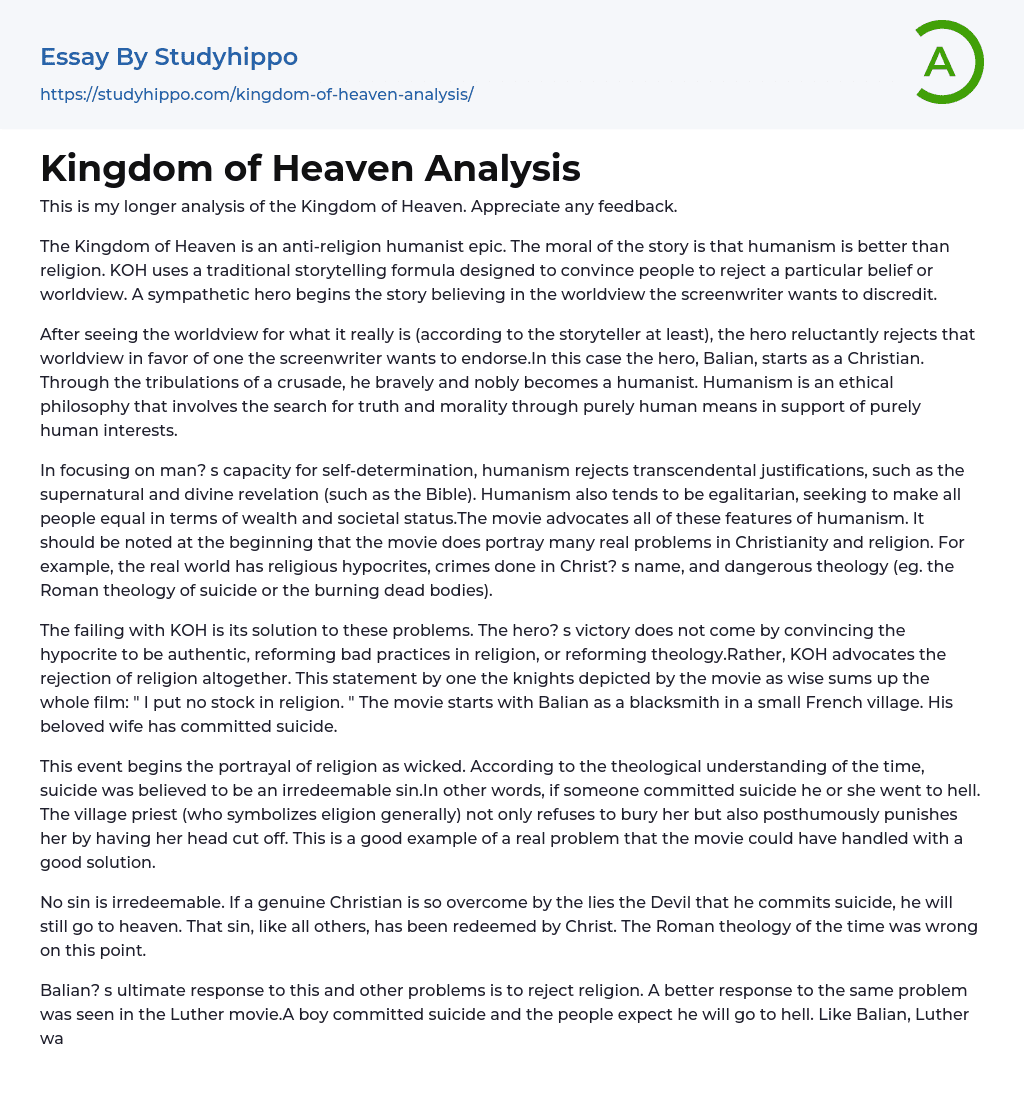Feel free to give me feedback on my extended assessment of the Kingdom of Heaven.
The film, Kingdom of Heaven, is a humanist epic that opposes religion. Its message is that humanism is superior to religious beliefs. The movie employs a conventional narrative structure that intends to persuade viewers to reject a particular belief or perspective. Its protagonist initially embraces the worldview that the writer seeks to undermine.
Upon recognizing the true nature of the worldview as presented by the storyteller, the hero ultimately chooses to reject it in favor of a worldview that aligns with the screenwriter's message. Initially a Christian, the hero Balian undergoes trials during a crusade and emerges as a courageous humanist who believes in finding truth and morality through purely human endeavors for the betterment of humanity.
The movie promotes the principles of humanism, which emphasizes on m
...an's ability to determine their own destiny. It rejects transcendental justifications such as supernatural or divine revelation, including the Bible. Humanism advocates for egalitarianism, striving towards equality in wealth and societal status among all people. Although it is important to acknowledge that the movie highlights valid issues in Christianity and religion, such as religious hypocrisy, crimes committed in Christ’s name, and dangerous theology like Roman concepts of suicide or burning dead bodies.
KOH's solution to the problems is a failure. The hero's success does not involve convincing hypocrites to be genuine, rectifying religious malpractices, or reforming theology. Instead, KOH proposes the abandonment of religion altogether. One of the movie's wise knights encapsulates the entire film with this statement: "I have no faith in religion." Balian starts the movie as a blacksmith in a small Frenc
village, having lost his wife to suicide, whom he cherished deeply.
Starting with this event, the religion is depicted as evil as per the theological perspective of that era where suicide was considered an unforgivable sin leading to hell. Reflecting religion in general, the village priest denies the burial and additionally chops off the head post-mortem as a form of punishment. This presents a genuine predicament that the film could have resolved effectively.
Despite the mistaken belief of Roman theology at the time, any sin committed by a true Christian, including suicide influenced by the lies of the Devil, is still redeemable through Christ and will lead to heaven.
Balian rejects religion as his solution to various problems, while Luther was faced with a similar dilemma in the movie when a young boy's suicide led people to believe he would go to hell. However, Luther's approach to this problem was considered better than Balian's.
Instead of completely rejecting religion, Luther opposes the theology of suicide on Christian principles and believes that the boy was deceived by the Devil. He also emphasizes that God will pardon him. Luther advocates for a Christian burial for the boy, providing last rites for him. Even though both movies address the same issue of erroneous theological views on suicide as an unforgivable sin, they present dissimilar remedies. Kingdom of Heaven sees it as a progression towards disavowing religion.
In Luther's teachings, there is a process of cleansing the religious practices. However, the priest is confronted with some issues. He engages in theft by stealing a gold cross from a deceased body and he also displays acts of cruelty.
Mocking the grieving Balian, the priest epitomizes
the wickedness inherent in most religious figures depicted in the movie. The priest jeers that Balian's wife is in hell and wonders what she's doing without a head. In a burst of anger, Balian kills the priest and then goes to Jerusalem seeking forgiveness.
A shift toward humanism occurs for Balian during various occurrences in Jerusalem. These include observing Muslims at prayer - their actions bear resemblance to Christian prayer, suggesting a moral equality - and encountering the humanistic approaches of both the Christian King of Jerusalem and the Muslim Saladin, which foster religious harmony. Balian also gains insights from wise figures like his father and the King of Jerusalem, as well as witnessing the fervor and greed of extreme religious groups, and challenging religious authorities, including the Bishop of Jerusalem.
- Baptism essays
- Holy Spirit essays
- Jesus Christ essays
- Adam And Eve essays
- Crucifixion Of Jesus essays
- Crusades essays
- Eucharist essays
- God The Father essays
- Pope essays
- Protestantism essays
- Christian essays
- Church essays
- Elizabeth essays
- Sacrament essays
- Catholic Church essays
- Lord essays
- Priest essays
- Protestant Reformation essays
- The Pursuit Of Happiness essays
- Afterlife essays
- Atheism essays
- Bible essays
- Buddhism essays
- Christian Worldview essays
- Christianity essays
- Confession essays
- Cosmological Argument essays
- Deism essays
- Devil essays
- Existence of God essays
- Faith essays
- Freedom Of Religion essays
- God essays
- Hinduism essays
- Immortality essays
- Islam essays
- Jainism essays
- Jews essays
- Judaism essays
- Miracle essays
- Monk essays
- Monotheism essays
- New Testament essays
- Old Testament essays
- Pilgrimage essays
- Puritans essays
- Revelation essays
- Ritual essays
- Salvation essays
- Sin essays




